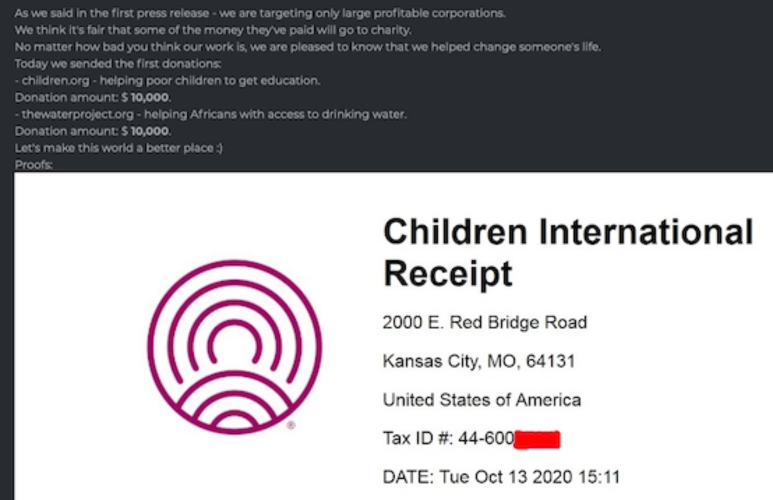Two charities received about $10,000 in donations in digital currency Bitcoin from a group claiming to have made the gift from proceeds it received after a ransomware payment by corporations.
Children International and The Water Project each received donations of 0.88 Bitcoin (BTC), which translates to about $10,000, from a cybercriminal group called Darkside. The Water Project, based in Concord, N.H., did not reply to an email and telephone message seeking comment.
“This is a first for Children International,” Dan Wilinsky, a spokesman for the Kansas City, Mo.-based charity, said in a telephone interview. “We are investigating and aware of the situation,” he said, adding that if Children International finds that this is the result of a hack or cybercrime, it will return the donation.
Children International supports children and families in the United States and around the world. The Water Project provides reliable water projects in communities in sub-Saharan Africa that lack access to clean water and proper sanitation.
In a post online on Oct. 13, Darkside said hackers target only large, profitable corporations. “We think it’s fair that some of the money they’ve paid will go to charity. No matter how bad you think our work is, we are pleased to know that we helped change someone’s life.”
In a follow-up message “for press,” Darkside posted: “You are only harming the company that processes the donations, as well as the companies who received them. Do not publish company names. The next donations will be made anonymously.”
The donations were made through The Giving Block, a Washington, D.C.-based platform founded in 2018 that enables charities to accept donations via cryptocurrency. The Giving Block works with almost 70 charities, according to its website.
In response to a request for comment by The NonProfit Times, Co-Founder Pat Duffy provided a statement by The Giving Block that said in part: “These funds have not been connected to a known hack, otherwise, they would have automatically been blocked by the compliance safeguards in place to proactively monitor incoming transactions. If these funds truly turn out to truly be illicit, they will be returned to their rightful owner.” The statement also noted that cryptocurrency is more transparent and traceable than U.S. dollars, which is why crypto donations have lower fraud rates than credit card donations, though it did not provide details.
“There’s no way of knowing where that money came from but it’s likely just a drop in the ocean to this group,” said Brett Callow, a threat analyst with cybersecurity firm EMSISOFT. “There are huge, huge sums involved” in ransomware, he said. An estimated $1.7 billion was paid in ransoms last year and pretty much all of it was in Bitcoin, according to Callow.
“Some groups like to try to give themselves a veneer of respectability. It’s probably part of the reason they made the donation, but they’re simply for-profit extortionists,” Callow said.
The Water Project’s website prominently displays messages that it accepts donations through cryptocurrency, with a page that translates how much in Bitcoin can provide people with clean, safe water. For instance, 0.88 Bitcoin can provide almost 340 people with clean, safe water or almost enough for a small community water project (0.9327 BTC).
“It certainly creates some challenges, allowing anonymous payments to be made like this,” Callow said. “Obviously it has the potential for systems to be misused,” he said, such as for money laundering. “In most areas of life, you couldn’t walk into some area and hand over a bundle of cash without someone asking questions,” Callow said. “But that seems to be what happened here, more or less.”










